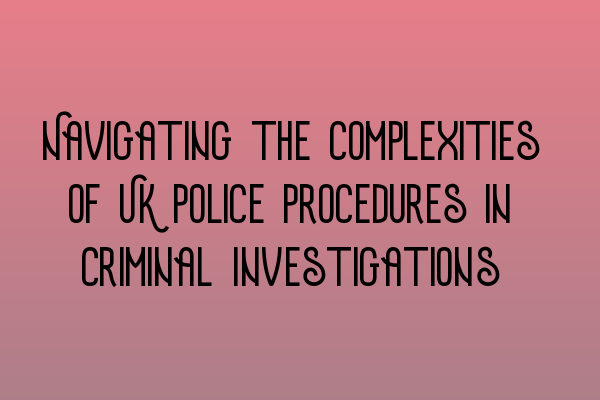Navigating the Complexities of UK Police Procedures in Criminal Investigations
When it comes to criminal investigations in the UK, understanding the intricacies of police procedures is crucial. Whether you are a solicitor, a law student, or simply interested in the field, having a comprehensive knowledge of how the system works can greatly enhance your understanding and effectiveness in handling criminal cases.
The UK police operate within a structured framework that ensures accountability, fairness, and the protection of individual rights. The Criminal Procedure and Investigations Act 1996, along with other legislation and guidelines, define the various stages and steps involved in conducting a criminal investigation.
The Investigation Process
A criminal investigation typically begins when a crime is reported to the police. The initial response may involve gathering evidence, conducting interviews, and securing the crime scene. Throughout the investigation, the police follow specific procedures to ensure the integrity of the evidence and the rights of all parties involved.
One important aspect of police procedures is the collection and preservation of evidence. This plays a critical role in securing convictions and ensuring a fair trial. The evidence may include physical items, witness statements, CCTV footage, or digital data. Adequate documentation and proper handling of evidence are essential to avoid any potential legal challenges.
During the investigation, the police may also use various investigative techniques, such as surveillance operations, forensic analysis, and interviews with suspects, victims, and witnesses. Each step is carefully documented to create a comprehensive investigative file and to protect the rights of all parties.
Understanding Police Powers
As part of their duties, the police have certain powers granted to them by law. These powers enable them to gather evidence, make arrests, and conduct searches. It is crucial to understand and respect these powers, as they form the basis of a fair and lawful investigation.
When gathering evidence, the police may request information or documents from individuals or organizations. In some cases, they may also exercise their powers to enter premises or seize property deemed relevant to the investigation. However, it is important to note that these powers must be exercised lawfully and with proper authorization.
When it comes to arrests, the police must have reasonable grounds to believe that a suspect has committed a crime. They must inform the arrested person of their rights, such as the right to legal representation and the right to remain silent. Understanding these rights is essential for both the suspect and their legal representatives.
Challenges and Legal Considerations
As with any legal process, criminal investigations can be complex and pose unique challenges. The actions of the police must withstand scrutiny to ensure a fair trial and protect the rights of all parties involved. The handling of evidence and adherence to proper procedures are crucial elements in avoiding potential challenges.
Furthermore, legal professionals and individuals involved in criminal investigations must stay up to date with the latest developments and changes in legislation and guidelines. This ensures that they are well-informed and able to navigate the complexities of the system effectively.
Conclusion
Navigating the complexities of UK police procedures in criminal investigations requires a comprehensive understanding of the legal framework, the investigation process, police powers, and legal considerations. By staying informed and up to date with the latest developments, individuals can better serve their clients, enhance their legal knowledge, and contribute to a fair and just criminal justice system.
